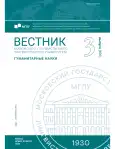Linguotypology of Hybrid Deliberative Network Discourse of Sport Fans
- Authors: Zahra O.V.1, Bredikhin S.N.1
-
Affiliations:
- North Caucasus Federal University
- Issue: No 3(897) (2025)
- Pages: 56-64
- Section: Linguistics
- URL: https://journal-vniispk.ru/2542-2197/article/view/286481
- ID: 286481
Cite item
Abstract
The study aims to determine the key linguotypological characteristics of online fan discourse as a form of specific, expanded, non-cooperative interaction. Common areas of relativity of initial posts and the information reasons behind them are built on the basis of a set of techniques of the dialecticalrelational method of critical discourse analysis. The research procedures include the analysis of the genre typology of sports discourse, as well as the identification of conventionalized polycode markers of the convictivity of an active actor and the definition of emotive-affective elements of the actualization of deliberative space. The conclusion is made about the primacy of conventionalized verbal components (terms, professionalisms, argumentative references to precedent phenomena) when expressing the confidence of an active actor in stimulus-reactive interaction, and about the dominance of emotive attractors in the intimization of content and evaluation.
About the authors
Osama Vahib Zahra
North Caucasus Federal University
Author for correspondence.
Email: osama.zahra0093@gmail.com
assistant of the Department of Linguistics of the Faculty of International Relations
Russian FederationSergey Nikolaevich Bredikhin
North Caucasus Federal University
Email: bredichinsergey@yandex.ru
Doctor of Philology (Dr. habil.), Professor, Professor of the Department of Linguistics of the Faculty of International Relations
Russian FederationReferences
- Doroshchuk, E. S., Ramazanov, I. I. (2021). Digital technologies of sports media in the modern information landscape. International research journal, 9(111), 3, 132–135. (In Russ.)
- Stepanova, M. A. (2015). Media and political discourse: profiling as an instrument of interpretation. Philology. Theory & Practice, 2(44), II, 177–180. (In Russ.)
- Bredikhin, S. N., Kamensky, M. V., Shibkova, O. S. (2024). New media in the process of conceptual value space modification. Proceedings of Voronezh State University. Series: Philology. Journalism, 2, 107–111. (In Russ.)
- Zakhra O. (2023). Metaforicheskaya nominatsiya v sportivnom internet-diskurse = Metaphorical nomination in internet sports discourse. Yazyk-tekst-diskurs v novykh usloviyakh kommunikatsii (k 60-letiyu professor T. B. Radbilya) (pp. 153–160): Sbornik statey po materialam Mezhdunarodnoy nauchnoy konferentsii (Nizhny Novgorod, November 22–24 2023). Nizhny Novgorod: Lobachevsky State University of Nizhny Novgorod. (In Russ.)
- Bredikhin, S. N. (2023). Teoriya nekooperativnykh igr v porozhdenii i interpretatsii vyskazyvaniy institutsional’nogo diskursa = The theory of noncooperative games in generation and interpretation of utterances in institutional discourse. Professional’naya kommunikatsiya: aktual’nye voprosy lingvistiki i metodiki, 16, 50–58. (In Russ.)
- Fairclough, N. A (2009). Dialectical-Relational Approach to Critical Discourse Analysis. Methods of Critical Discourse Analysis (pp. 162–186). London: Sage. (In Eng.)
- Serio, P. (2002). Kak chitayut teksty vo Frantsii = How texts are read in France. Kvadratura smysla: Frantsuzskaya shkola analiza diskursa (pp. 12–53). Мoscow: Progress. (In Russ.)
- Karasik, V. I. (2000). O tipakh diskursa = On the discourse types. Yazykovaya lichnost’: institutsional’nyy i personal’nyy diskurs (pp. 5–20). Volgograd: Peremena. (In Russ.)
- Zilbert, B. A., Zilbert, A. B. (2001). Sportivnyy diskurs: bazovye ponyatiya i kategorii; issledovatel’skie zadachi = Sports discourse: Basic notions and categories, research questions. Yazyk, soznanie, kommunikatsiya, 17, 45–55. (In Russ.)
- Alferov, A. V., Kustova, E. Yu. (2019). Deliberativnyy diskurs kak mekhanizm politicheskoy interaktsii: strategiya issledovaniya = Deliberative discourse as a mechanism of political interaction. Studia Germanica, Romanica et Comparatistica, 15, 1–2(43–44), 85–92. (In Russ.)
- Zilbert, A. B. (2001). Sportivnyi diskurs: tochki peresecheniya s drugimi diskursami (problemy intertekstual’nosti) = Sports discourse: intersection points with other discourses (intertextuality problems). Yazyk, soznanie, kommunikatsiya, 19, 103–112. (In Russ.)
- Bredikhin, S. N., Serebriakov A. A., Manaenko G. N. (2024). Modeling the transition of private pertinence into collective relevance in internet communication. Current issues in philology and pedagogical linguistics, 2, 189–199. (In Russ.)
- Snyatkov, K. V. (2007). Televizionnyy sportivnyy diskurs: aspekty kommunikativno-pragmaticheskogo analiza = Television sports discourse: aspects of communicative and pragmatic analysis. Izvestia. Herzen University Journal of Humanities & Sciences, 14(37), 189–194. (In Russ.)
- Malysheva, E. G. (2011). Russkiy sportivnyy diskurs: lingvokognitivnoe issledovanie = Russian Sports Discourse: a linguocognitive study. Omsk: Omsk State University. (In Russ.)
- Bredikhin, S. N., Shibkova, O. S., Gusarenko, S. V. (2023). Cognitive blending as the basis for utterance relevance generation. Current Issues in Philology and Pedagogical Linguistics, 4, 118–128. (In Russ.)
- Istrate, P. (2006). Lingvostilisticheskie i ritoricheskie osobennosti sportivnogo reportazha kak zhanra SMI (na materiale futbol’nogo reportazha) = Linguostylistic and rhetorical features of sports reporting as a media genre (based on the material of football reporting): abstract of PhD in Philology. Мoscow. (In Russ.)
Supplementary files










